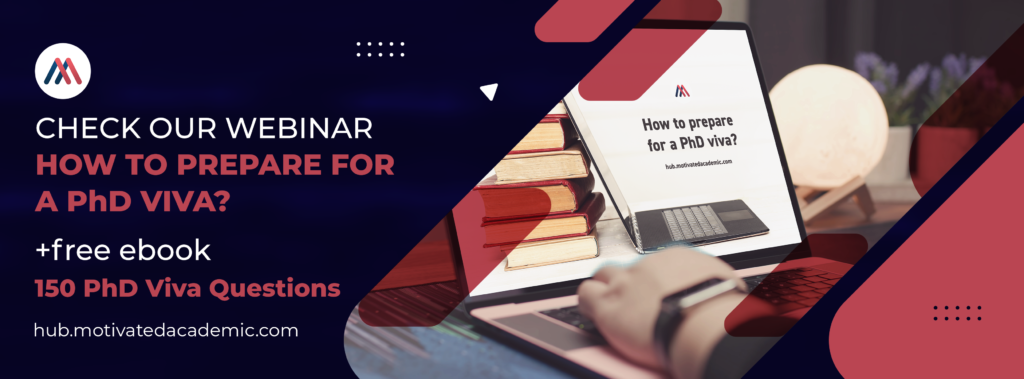We all know that a PhD is a major undertaking and requires lots of devotion and determination. After all, during that period of time, we’re advancing the understanding of our world!
Having spent 3-5 years working on your PhD project, you’re about to submit your PhD thesis for examination. But the question that you may be pondering about is “what’s going to happen next”?

Obviously, you may know that the next step is to pass the PhD viva exam and you may have discussed this with your supervisor.
However, in my discussions with current PhD students, I noticed that there’s a general lack of understanding of what is a PhD viva, what to expect and how to prepare for it. I was there too before my VIVA.
Remember that depending on your university, country and field of study there will be some variability in the process, types of questions and focus of the examination itself. However, there are some generic components of each viva that are shared across the fields and topics.
That’s why in this article I’m going to share my answer to the most common questions I get regarding PhD viva. I will also explain what is a PhD viva and what you can expect! I trust this will give you an idea of what to expect and where to start your preparations.

Table of Contents
What is a PhD viva voce and what to expect?
In the most generic terms, viva voce (aka. viva) is an oral examination that takes place at the very end of your PhD programme. It’s compulsory for essentially all PhD students.
The main aim of this examination is to verify your knowledge and understanding of your field of knowledge, as well as evaluate the CONTRIBUTION and NOVELTY of your work.
Therefore, the list of questions you may expect to receive during your examination will aim to assess:
- the depth of knowledge you have in your specific research area
- the breadth of knowledge you have in the broader research field relevant to your work
- your ability to place your work in a broader context and demonstrate your contribution
- your contribution to the body of knowledge
- your understanding of the limitations of your work and your ideas of how these can be (potentially) solved
- whether your work is indeed yours
However here’s the thing. Even though we often refer to it as “an exam”, I don’t want you to see your examination as something you should merely pass.
When I was about to take my PhD viva, I was scared and overwhelmed for weeks. After all, it is THE MOST IMPORTANT EXAM IN YOUR LIFE. Right? You’ll be able to call yourself a doctor once you pass it.
However, having spent several years in academia and having attended PhD vivas as an examiner, I can tell you this: you’ll do much better if you treat your viva as DISCUSSION with your examination panel and place yourself as equal to them. You are the expert in your PhD topic and you need to present yourself as such.
Let me ask you one question that I was asked right before my viva: do you want to be seen as a student or as a doctor during that meeting?
How long is viva?
This is the question that I get quite often. However, I don’t think there is a simple answer. The time that your viva will take depends on many factors.
The duration of your viva will depend on:
- how well you presented your work in the PhD thesis and whether there are any major issues
- how well you are prepared and how you respond to questions
- how much your examiners (and sometimes supervisors) enjoy the discussion
- country/university specific rules regarding the duration
Therefore, it’s almost impossible to provide accurate advice on how much time your viva should take. For example, my viva took around 2 hours, but I know of instances when the viva took 6-8 hours. From my experience, the average duration takes around 3.5 hours. How long was yours?
Who will form your PhD viva panel?
As a rule of thumb, your PhD viva panel will comprise at least one internal examiner and one external examiner. The former will be from your university and the latter will be from another university.
The primary role of your examiners is to assess the novelty of your work and whether it is you who carried out this piece of work. They will also attempt to discuss any issues and challenges they found when (thoroughly) reading your thesis. They will test your understanding of the key concepts and theories that you put forward in your thesis.
Why they do this? To put it in simple words, your examiners need to establish whether you can conduct and discuss research at the level appropriate to award you a PhD degree.
It’s also common that your panel will have a chairperson. They are responsible to ensure that an appropriate (and fair) process is observed. They may also take notes during the examination to capture any important comments or suggestions from the supervisors. At some universities, it is common that an internal examiner acts as a chairperson.
Your supervisor(s) can also be present at your PhD viva, but their role will vary significantly from country to country. In the UK, for example, they are prohibited from speaking during the viva and are present only as observers (and potentially enhancing your self-esteem). Make sure you ask your supervisors to help you prepare, for example, by organising mock viva in your department.
Finally, again depending on where you are doing your PhD degree, your viva may be a closed meeting between you and your panel, as it happens in the UK, or it can be open PhD defence. The latter case is popular in most of the European countries and the US. This means that you usually are expected to give a lecture about your research and then can be asked questions from anyone present during your examination, including the examiners, supervisors and audience.
Which one would you prefer? I had a “closed” viva and I was quite happy about this!

What are possible PhD viva outcomes?
We have discussed what viva is, how long it takes, who is present during your examinations and what is expected of you. But what happens after your examiners finish their questioning?
Your examiners need to agree on the outcome that will accurately represent the quality of your work and your performance during the viva. That’s why I wanted to discuss the potential PhD viva outcomes here to give you some clarity on what these mean.
In general, there are six potential outcomes out of your PhD viva (at least in the UK!). Your examiners need to select one outcome from:
- award PhD degree without corrections – this outcome means you’ve impressed your examiners and you’ve passed your PhD degree without any corrections. This is a rare recommendations so if you do receive it, a proper celebration is in order!
- minor corrections required – this outcome means that your research met the required standard for you to be awarded the PhD degree, but there are minor grammatical, typographial, textual or presentational errors present in your thesis. This is by far the most common recommendation so if you do receive it, you’ve done very well!
- major corrections required – this outcome means that your research meets the required standard for you to be awarded the PhD degree, but there are significant corrections and revisions to be made. This can include improvements in thesis structure, clarity, rewriting chapters and even addition of additional analysis. This is a fairly common recommendation and your external examiner is likely to request to verify your corrections.
- revise and represent – this outcome means that content, extent of analysis and discussion doesn’t meet the required standard for you to be awarded the PhD degree. However, the PhD panel see the potential of your work and decided that with additional work, it can meet the requirements. You will need to undertake additional research and analysis, and present it to the examination panel again.
- award MPhil degree – this outcome means that the extent of your work doesn’t meet the PhD standard, but it does meet the lower award standard (i.e. Master of Philosophy). This can be either in terms of the orginality of your work and the volume of your work. The examiners may recommend this outcome if they conclude that it won’t be realistic to perform additional research for the revise and represent outcome.
- immediate fail – this outcome is very rare and means that you’ve failed to meet the required standard for a PhD and an MPhil.
Conclusions
Remember, your PhD thesis is important but isn’t the only component that will get you a PhD. It’s the PhD viva! In this article, I explained what is a PhD viva, what kind of viva questions you can expect, and answered other common questions about the PhD viva.
What helped me to stay calm, motivated and pass my PhD viva with flying colours was (of course the unlimited support from Magda 😉) the understanding of the examination process, the expectations and requirements, potential outcomes and a lot of practice. I also found it useful to plan my preparation. Remember to have a look at my previous articles on how you can set goals and develop a daily plan for your research.
It’s easy to get overwhelmed and anxious because of your PhD viva. I get this – I was there myself! That’s why we created Motivated Academic to support researchers like yourself! Check our webinar on PhD viva preparation and our viva coaching.






